
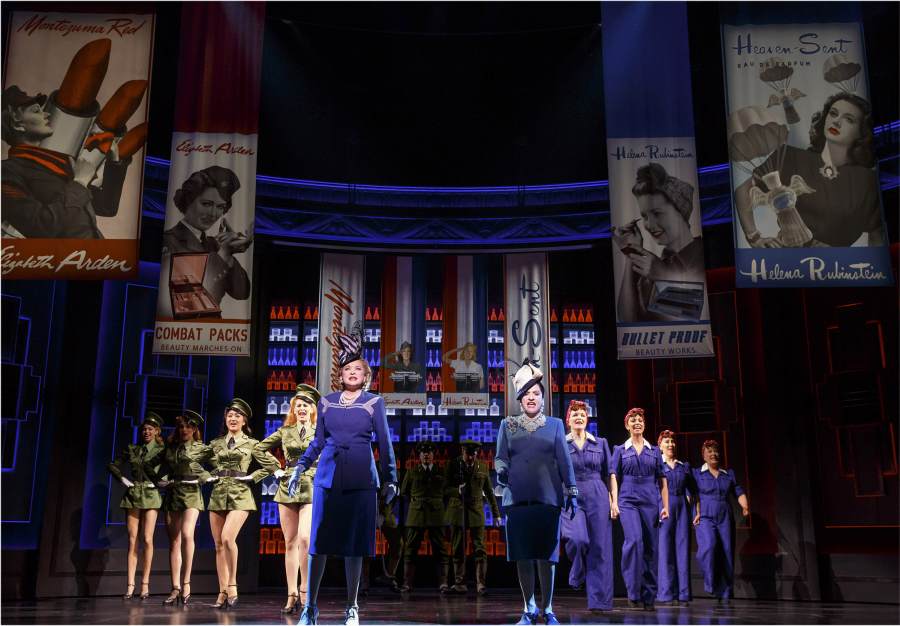
Scott Frankel and Michael Korie are the composers behind some of the greatest female characters in contemporary musical theatre, not to mention some of the most inventive. Along with book writer Doug Wright in Grey Gardens they turned a cult documentary into a bittersweet portrait of loneliness and crushed dreams, took Todd Haynes’ already miraculous Far From Heaven and added new layers by turning its silences into aching songs, and reunited with Wright for War Paint, they took a book about the rivalry between makeup moguls Helena Rubinstein (Patti LuPone) and Elizabeth Arden (Christine Ebersole) and turned it into an ode about the power of womanhood, a cautionary tale about misogyny, and a reminder that we have a long way to go in the battle for equality.
After a production at the Goodman Theatre in Chicago in the summer of 2016, War Paint was one of the last musicals to open in the crowded 2016-2017 Broadway season, and while the performances of leading ladies Ebersole and LuPone, along with the design elements, have been rightly applauded, the score consisting of Frankel’s sweeping melodies and Korie’s insightful lyrics has remained on the, shall we say underappreciated side. Combining elements of classic musicals, Hollywood noir and horror, as well as traditional 11 o’clock numbers, the songs in War Paint tell entire stories individually. For example there’s the feminist cry in the astonishing “If I’d Been a Man”, the infuriating sexism revealed by the male characters in “Step on Out”, the catchy war anthem “Necessity is the Mother of Invention”, and the powerful message of “Beauty in the World”. Now there’s a cast recording out by Ghostlight/Sh-K/Boom Records, let us all rejoice in the understated brilliance of this score.
To celebrate the album’s release I spoke to Frankel and Korie about the methods they use to work together, how the meaning behind some of the songs changed after the election, and why they write musicals about women.
“Best Face Forward” begins like a classic musical opener and it made me think of great shows and films of the 1940s and 50s, but then as the narrator begins to question the women about their beauty regimes it takes a Bernard Herrmann-esque tone with ominous strings. Can you talk about the duality in this song?
Scott Frankel: I was trying to have a little bit of fun with the idea that for these women having the wrong product or being accused of not maintaining themselves perfectly was a little akin to a horror movie, like Psycho in the shower, you were right about that reference.
I was trying to put people in the mind of these old films from the 30s, 40s and 50s - Scott Frankel Click To TweetHow was it to combine these two very different styles specifically, cause you take people from feeling like Audrey Hepburn in Funny Face to the Psycho strings?
Scott Frankel: You’re right on both of those references, I was trying to put people in the mind of these old films from the 30s, 40s and 50s, in terms of getting the audience’s ears acclimated to the journey back in time. These were times when music and underscore were used maybe more overtly than it is today, they were used to establish mood, a feeling or a period.
I love “Behind the Red Door” because it celebrates the Elizabeth Arden brand, but it’s also kind of like a horror story. The lyrics talk about beauty treatments that sound like torture.
Michael Korie: “Behind the Red Door” evokes secrecy and yeah, the Vienna youth mask is horrifying! Women put electrical gadgets on their faces and send volts of electricity into them. The salon in the movie The Women was based on Arden’s salon and one gets the feeling that before women of certain means entered the workplace that’s where they spent their days, being tortured into beauty. There’s also the desperation of not being left behind by time, not being replaced by the second or third wife, you had to stay young. The musical gets around to asking if Helena and Elizabeth made women freer or enslaved them to their products?
Out of all these beauty treatments described in “Behind the Red Door” which did you find the most horrifying and which would you have wanted to try?
Michael Korie: I would be afraid of those treatments. The three of us put on lipstick for a photograph we made for our producers on opening night and honestly that was the first time I put on lipstick and I found it to be a terrifying experience. I thought once it was on I had totally the wrong shade, luckily Doug’s husband treated the photograph, made it in black and white so only the lipstick was in color and that looked much better. But all of it is scary and fascinating! When you’re a kid looking at your mother’s table with all the fancy stuff in it, in bright shiny packages and tubes and compacts and mirrors. You walk into Macy’s and it’s overwhelming, it’s like a football field full of mirrored cosmetic counters and you wonder what the difference is between them all. Women can navigate it, I find it daunting, but that was part of the fascination that drew me to this. The forbidden fruit.
Scott Frankel: I don’t know. There’s one in which women are in these vats of boiling water, they almost look like a mental hospital, the top is zipped shut, so all you can see are their heads. That one seemed gruesome to me, and the Vienna Youth mask is really hardcore.
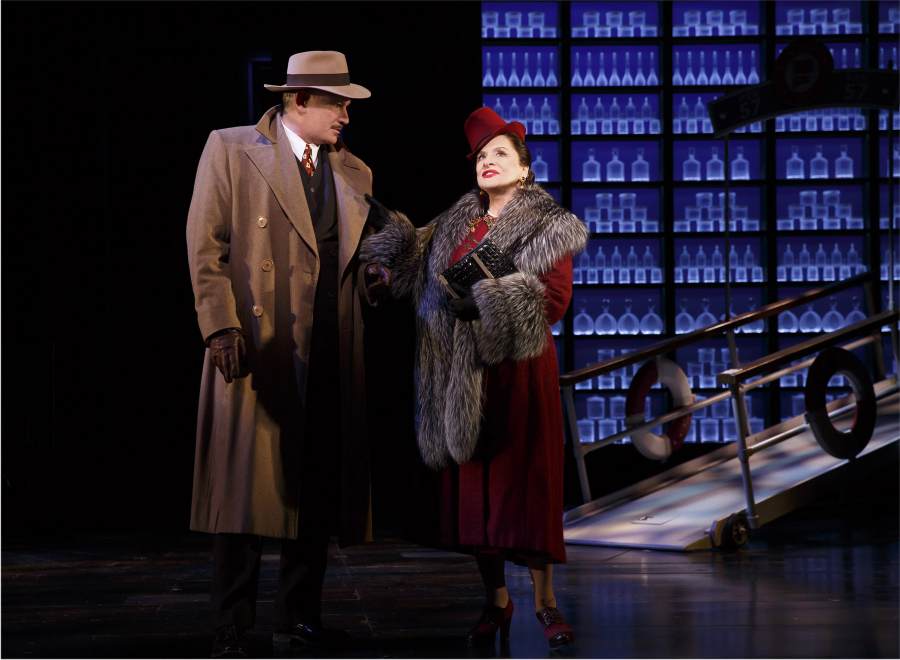
I’m fascinated by how the songs and scenes in the musical mirror each other, leading us to the conclusion that these women could’ve easily been one another if it wasn’t for how they were pitted against each other. Michael, this made me think of the idea you propose in your opera Hopper’s Wife, and also made me think of Ingmar Bergman’s Persona. Can you both talk a little about this theme?
Michael Korie: Oh, you’re figuring out all my secrets. I think that was what so remarkable about these women, that they could’ve been allies, they could’ve been friends. They worked maybe a block apart from each other, they catered to the same wealthy class of women, although Helena catered to the immigrant woman, to the Jewish woman, and Elizabeth catered to la creme de la creme, the Park Avenue society, blue book crowd. But in essence though competitors, they were similar; however in that day and age they were the only two women with companies named after themselves, and I think they each thought they had invented this, so they wanted credit in the same way Henry Ford and Thomas Edison got credit. But because they were women the press and public found it amusing to create a rivalry and pit them against each other, so one was never mentioned without the other and this conflict was stoked. They fell into it.
The musical doesn’t go into that much detail, it’s implied, but since it’s about two women in the same orbit not speaking to each other, there was a desire on the part of the authors to create mirror images as you say. The mirror was an important concept when we were working on the show, at one point we even talked about having them talk to each other through a mirror, we abandoned that concept because we felt it detracted from the scene where they finally meet in the end. We made a conscious effort to have them grapple with the same issues and conflicts that the other woman was grappling with.
We also had the challenge of writing a musical with two leads. I guess even Chicago which has two women, doesn’t make them equals, I think Roxie Hart was the bigger of the two roles. In War Paint we have two equals, and by casting two stars of this calibre you need two entrance songs, two “I am” or “I want” songs, two 11 o’clock numbers, and because we have the fictitious meeting in the end we need a 12 o’clock number, basically there’s three 11 o’clock numbers in a row.
We made a conscious effort to have them grapple with the same issues and conflicts - Michael Korie Click To TweetScott Frankel: With the two opening numbers, Elizabeth’s “Behind the Red Door” and Helena’s “Back on Top” I wanted to establish Arden with a breezier, swing number with the Arden girls singing the swing song, but then we tackle various styles, it has a waltz section, a rhumba section, and the high note at the end. Rubinstein as a Polish emigré, I wanted to establish a minor key sound for her, a little more angular and sharp. I wanted to set up a musical contrast that was just as strong as the visual contrast in Christine and Patti, the blonde vs. the dark, the tall vs. the short, the patrician vs. the ethnic. That continues through the show all the way to their 11 o’clock numbers, “Pink” and “Forever Beautiful”. And when they sing together we wanted the audience to see they were indeed more similar than they’d like to think, that they shared thoughts, opinions, they sang the same songs in different locations. We hoped the audience would see something they don’t see until the end.
Michael Korie: We also have the fact that they did go after each other’s right hand men, Helena ended up with Elizabeth’s ex-husband working for her, and Elizabeth ended up with Helena’s right hand man who is a composite of two characters we called Harry. All of that happened at the same time, they were also both involved in Congressional hearings on cosmetics in the time before cosmetic companies had to label their ingredients. Can you imagine? There was a time when nail polish was considered déclassé, which allowed Charles Revson to sneak in, and then they both also suffered from the war which led them to create cosmetics for women coming into the workplace to replace the men who went off to war. One of them even got a contract from the army to create camouflage makeup for the soldiers, they emerged from the war stronger than ever but they couldn’t contend with the fabulous 50s. They took makeup away from the prostitutes, artists and dance halls, and legitimized it for mothers, daughters and sisters by desexualizing it. They made it part of a regime, skincare, they emphasized health aspects and beauty. But along came Revson in the 50s and realized in the 50s with convertibles and hoop skirts women wanted makeup that was sexy and cheap. His campaign was based on sex appeal and low prices, which was everything these women had fought against. They refused to advertise on television so Elizabeth lost control of her company and Helena’s brand isn’t even sold in America anymore. Time acquits them and all these other people copy their ideas and no one remembered they had come up with all the phrases and strategies. They were eclipsed, the weird thing is while we were working on the musical in Chicago, the remains of Elizabeth Arden’s company was bought by Revlon.
What an irony.
Michael Korie: Men couldn’t figure out money could be made from makeup, until these two women became millionaires and created Fortune 500 companies, so men came and took over. We should’ve known about these women before this musical, the book War Paint had been written, but I don’t think their accomplishments were given due credit. They lives into their 90s, died a few weeks apart. They did seem like mirror images.
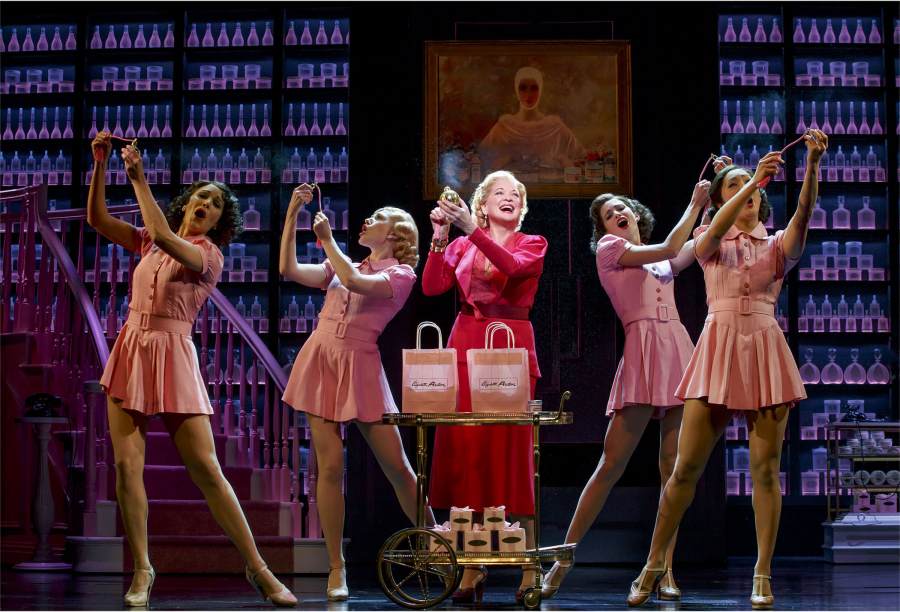
I found it quite fascinating that after the election Teen Vogue became one of the most vocal outlets when it came to social injustice, and we saw conservatives call them out for being a fashion magazine suddenly interested in politics. But women have been doing this forever!
Michael Korie: Like Helena says at one point, “excuse me, what about Joan of Arc and Cleopatra?” these women had makeup and led armies. You’re right, this election was a real eye opener. When we wrote the musical we all expected Hillary to win, we thought the glass ceiling would be shattered and the musical would reflect a time before that. Then lo and behold, it seemed that this country would make steps towards progress, but digs in its heels when it comes to a woman, inexplicably to us she lost and the worst possible outcome happened. So then the whole musical started reading differently.
Can you talk about “If I’d Been a Man” specifically?
Michael Korie: The song became very sad, but also in Elizabeth’s song near the end where she sings “long before the circus came to town” everyone interprets it as the Trump circus. It all registered more deeply, and yet I think there’s a note of hope where it says “who will stand for beauty in the world?”, we have to keep that flame alive, not submit to vulgarity and corruption.
Scott Frankel: It’s certainly a rueful, introspective song. Both women wonder at the same time if they have to go through the same indignities and suffer through the same tribulations if they were men. We all thought the song would be a triumphant look back but when the election went the other way, obviously a lot has changed for women since the time in the musical, but we all recognize how far we have to go to answer that question. You know, when Secretary Clinton was there for opening night that was the song I looked over at her and wondered what she thought of the song.
We all expected Hillary to win, we thought the glass ceiling would be shattered - Michael Korie Click To TweetHow do you two compose together?
Michael Korie: I’ll give you all my chef secrets, in “Behind the Red Door” for instance we sit with the book writer, Doug in this case, and we talk. We must’ve talked for six months, I’m interested in structure because I used to be a composer and I write opera librettos, but I don’t like to write books to musicals. I like to write lyrics for musicals and books for operas, but I have a lot of input and Doug and Scott are interested. So the three of us feel the whole musical through and feel the transitions, which are the most important things in musicals, it’s not the big ballads and knock ‘em dead moments, but the transitions and how the story is being told.
“Behind the Red Door” was maybe the first song we wrote, Scott wrote music first, then we had the title, it was maybe three times longer than it actually is, and I lyricized the whole thing. That was my opportunity to put in the Vienna youth mask and all the stuff he had in her salon, at one point we had fencing lessons with a Russian instructor, it was crazy, it would’ve taken 15 minutes, so thank God we cut it! A song like “Pink” I wrote the lyrics entirely, Christine listened to it and said that’s a great song but it’s not suited for my voice, so Scott wrote a new chorus and I wrote lyrics to the music. We also added new verses and the bridge, so the song was written twice, once to lyrics, once to music.
We work back and forth in different ways, I could go through the whole score and tell you which came first if music or lyrics. Sometimes we’ll also ask Doug to write dialogue in between the songs, or I’ll take some of the dialogue and say “this would be much better in a song”. We had a devil of a time setting up the end of the Act One scene, “Face to Face”, Doug kept writing scenes that would get us to the emotional place where the song could begin, but finally I realized I had to write a short introduction where they say “damn it, it’s all her fault”, Scott said he’d write it, so he went home, wrote angry music, I put words to it and Doug was happy because he didn’t have to write any more scenes.
You’re no strangers to writing music for female characters, but was it easier in any way to write songs for Helena and Elizabeth because they are women who were forced to “think like men”?
Michael Korie: Grey Gardens was a show where you felt the women could burst into song at any moment, so it wasn’t a stretch to make them musical. Like you say writing about business is tough, luckily when I go into my schizophrenic thing and become them when I write, a lot of the business that took place in Act Two when they were turning down Bill Paley, they were very hardened by then, I felt the decades before, the lack of equality hardened them, so I felt it from a personal place, not a business place. Helena was very close to me because she was a Jewish immigrant of the same generation my parents were, she called herself royalty and spoke with a heavy Polish accent, but really she inverted words like my grandmother did, so I wrote it into the lyrics. Patti was so happy to dig her teeth into it and learn how this woman spoke, whereas Elizabeth was also a manufactured personality, she grew up very poor in a farm in Canada and I think she adopted that Park Avenue society lady talk, so they had a style to the way they spoke and therefore sang. That was an inroad to me, so for whatever reason I like larger than life characters, I think in a musical you want to go as far as you can go. I don’t like it when supposedly average people sing about small things, a lot of people like it and are great it, but it’s not my thing, I like to go to extremes. I get excited when I’m listening to a song and I don’t feel dialogue can take you there, that’s the purpose of a musical.
Scott Frankel: I hadn’t thought about it like that, Helena and Elizabeth were certainly more powerful, masters of their own domain, and had a more financial wherewithal and independence than the women in Grey Gardens or Far From Heaven. With that said, yes I suppose the more triumphant, brassier stuff for them at the beginning of the show has a different color because they’re successful. When I write for characters what appeals to me are the chinks in the armor, where even the strongest people have vulnerabilities and introspection. Because they’re so strong, some of those introspective colors don’t show up until act two. I still hope they are sympathetic in the first act.
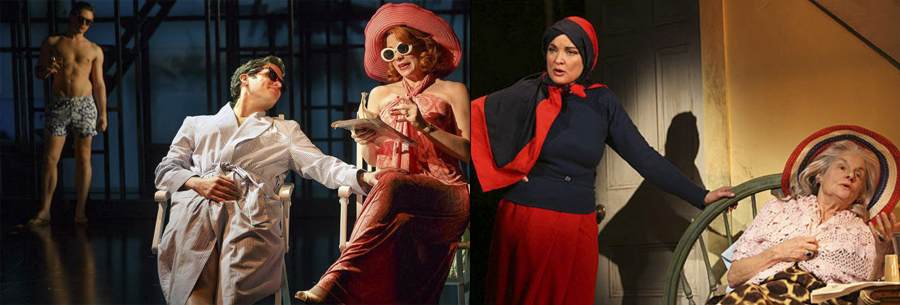
With Grey Gardens, Far From Heaven and War Paint, you have created a trilogy I’ve been calling “American Woman”, in which you depict how in the post-war years women were denied the American dream that was promised to everyone. What insight have you gained about this from doing these musicals?
Michael Korie: In at least two of them it pointed towards the 60s, the audience knew in Far From Heaven and they know in War Paint that a lot of the obstacles these women face were challenged and overcome. I don’t think we had to spell that out because the audience brings that with them. It’s wonderful when the audience can see a show and think because it’s in a different time it’s not about their life, but then in the course of the show realize “oh, it is my life, it’s really about now”. Obviously there’s something in the air that drew us to write this and is drawing people to see it, I feel an opera or a musical need to connect to the time they’re written in, there’s a stealthy way to do that which is to set it in a different period.
Are those three musicals in conversation with each other in a way? “Pink” made me think of “Jerry Likes My Corn” for instance.
Scott Frankel: Some people have said that “Pink” reminds them of “Another Winter in a Summer Town”, because they’re both in perspective numbers. The thing about “Pink” is Elizabeth Arden as presented in song, she’s less self-aware as a character than Helena Rubinstein, she’s not as plain spoken, she’s more guarded, so when she sings “Pink” it starts off as a genteel, gentle rumination, but then it gets kinda angry and raw. I think the audience is excited at the opportunity to see her exhibit some anger and fury about her situation. I didn’t think of it in terms of “Jerry Likes My Corn”, maybe there’s a dialogue between “Pink” and Far From Heaven where it’s women who take the speckle, or a spark of an idea for a song, a small microcosms like the color pink, or the Tuesdays and Thursdays of the carpool, and they look at that and it gets blown up larger and larger, it becomes a metaphor for the dissatisfactions they have with how their lives have turned out.
I think Elmer Bernstein’s score for Far From Heaven is one of the greatest of all time.
Scott Frankel: I agree.
Were you intimidated about creating a score for the musical?
Scott Frankel: That was one of the last scores he did before he died, from what I’ve read about it he was very consciously doing a throwback to some of the sounds that he had explored earlier in his film scores. I adore that score, but shortly after we decided to do the musical I stopped watching the movie and listening to the score, I only would read the screenplay because I wouldn’t want to have that sound in my ears. The difference is there are structural, conceptual differences between instrumental underscore and songs, in that film in particular what Todd Haynes and Elmer Bernstein can achieve in a wordless close up with the perfect underscore, we can’t do on the stage, so those are the moments that became songs, when the camera goes close on Julianne Moore or any of the other characters and they don’t say anything. Those seemed like great opportunities for them to sing and express their feelings.
You’re known for being masters at rewriting and cutting songs from your musicals. Have you ever written a song you simply would’ve refused to see go from a show?
Scott Frankel: Yes, I think that “Around the World” in Grey Gardens I wouldn’t have been inclined to entertain that someone suggested that it be rewritten or removed. In War Paint I think “Forever Beautiful” for me is one I’d never consider removing. In Far From Heaven the first act closer “The Only One”...but in general, musicals are jigsaw puzzles by their nature, so it’s about getting the proportions and the ingredients right. When you’re putting together text, music, acting, drama, direction, design and an audience, you could have the greatest song in the world but if the audience is ahead of you storytelling-wise then it’s foolish to hang on to it because you could win the battle and lose the war, so we’ve tried not to be too precious about our material. Aside from those pieces where I think “I can’t do better than this”, with that said, I didn’t think I could do better than “Forever Beautiful” but after Chicago, Patti pushed me and encouraged me to expand and deepen the section in the middle, I didn’t know how I was going to do it, but she ended up being right. You have to listen, be collaborative and know where the line is in the sand where you have to hold your guns. I listen to people when they tell me I can change something, but then if I don’t agree, I don’t agree.
Michael Korie: I’ve changed. I’m still a pain in the ass, but I used to be worst when it came to changes, I would fight and fight and fight and say “this is the right way”. Now I think this is a collaborative medium, I don’t know when that happened, so why should a collaborator need to sit there and be annoyed every time they felt a lyric felt wrong? There’s a way to make everyone happy, I can go to my place and find that way, so that’s what I do now. I don’t regret anything that we’ve cut. Someday Scott Frankel may admit that there are cut songs in his trunk and allow them to see the light of day, I have to tell you there are some great ones from Grey Gardens and War Paint. He likes to pretend they don’t exist.
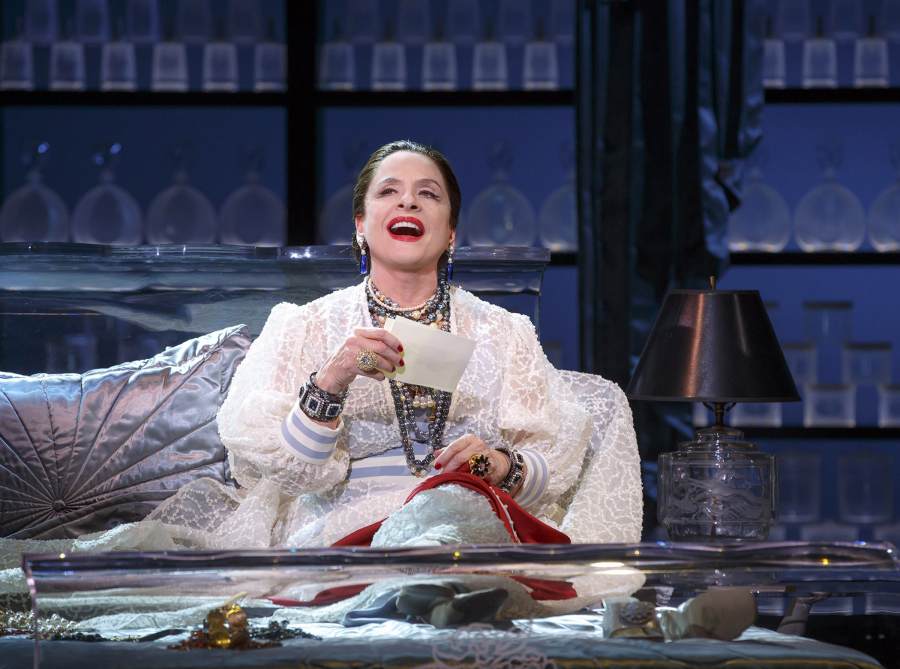
I loved “Forever Beautiful”, it reminded me about military marches, but it’s also a song about painting, not only the painters mentioned in the lyrics, but about the power of art to capture a person’s essence. Do you think there is a particular kind of art that does this better than the others?
Scott Frankel: I guess everyone marvels at the things they can’t do. I marvel at the visual arts, I can’t draw or sketch, so people who are able to conjure with oil, pencil or clay, I find that very mysterious. The thing about music though is there is that subliminal, even involuntary way in which it can affect you viscerally, emotionally. It can move you in ways you don’t understand, all the arts can move you in different ways, but there’s something about music, instrumental and the human voice. They’re both so human in how they’re produced and how they hit the ear, so you get a lot from them. I do think those portraits of Rubinstein capture her in such different, individual ways, the seriousness, imperiousness, her beauty, the auteur, they all capture parts of her. I’ve seen Patti in concerts a lot, and when she sings a Piaf, Brel or Weill song, she does them fantastically well, so when I was thinking about what that song would sound like for her, I had that kind of cabaret European sound in the back of my head. You can definitely hear some Kurt Weill in that song, because I’ve heard her sing “Surabaya Johnny” a million times and she’s amazing at it, that seems very much of that world. The ferociousness, the pull and the flavor, for me Patti connects to Piaf, Brel, Josephine Baker and Dietrich, she is that great singing actress, when she does a song they’re like three act plays.
Is there a song like “Forever Beautiful” that people best think encompass who you are?
Scott Frankel: Even though I can write uptempo music, I suspect it’s the more bittersweet ballads like “Pink” and “Another Winter in a Summer Town” that people would say most remind them of me. I guess I identify with characters who are in a dangerous or fragile place, there have been times in my life when I’ve been there.
I love the way in which “When There Was Beauty in the World” works as both a love song to what once was, but also a challenge to those who might believe there is still beauty in the world. Do you think there was actually a specific moment that contained more beauty than any other?
Michael Korie: For whatever reason I keep going back to eras that evoke my childhood and a time when men wore jackets and hats, women wore white gloves when they went out during the daytime. I wonder did people sweat? For some reason I go back to a time that maybe stopped in the late 60s. I came of age in the fabulous 70s when I was marching in Gay Pride and writing for the Village Voice, but there’s something almost sculptural about the era before. It seems beautiful, like walking through a sculpture garden at the Museum of Modern Art. There’s also something beautiful about lost civilizations.
War Paint is now open. The War Paint (Original Broadway Cast Recording) is available from Ghostlight/Sh-K-Boom Records, for more information click here.